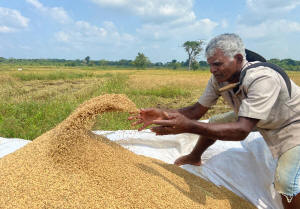Fertiliser ban decimates Sri Lankan crops as government popularity ebbs
 Send a link to a friend
Send a link to a friend
 [March 03, 2022] By
Uditha Jayasinghe and Devjyot Ghoshal [March 03, 2022] By
Uditha Jayasinghe and Devjyot Ghoshal
AGBOPURA, Sri Lanka (Reuters) - W.M.
Seneviratne sat watching a mechanised harvester slice through the jade
green fields around him in eastern Sri Lanka's Agbopura village one
recent morning, aware that this year's harvest would be only a fraction
of what he was used to.
"I cannot recall any time in the past when we had to struggle so much to
get a decent harvest," said Seneviratne, a lean 65-year-old with a shock
of silver hair, who has been farming since he was a child.
"Last year, we got 60 bags from these two acres. But this time it was
just 10," he added.
The dramatic fall in yields follows a decision last April by President
Gotabaya Rajapaksa to ban all chemical fertilisers in Sri Lanka - a move
that risks undermining support among rural voters who are key to his
family's grip on Sri Lankan politics.
Although the ban was rolled back after widespread protests, only a
trickle of chemical fertilisers made it to farms, which will likely lead
to an annual drop of at least 30% in paddy yields nationwide, according
to agricultural experts.
The shortfall comes at a bad time for the island nation of 22 million
people. Sri Lanka is in the throes of its worst economic crisis in a
decade, foreign exchange reserves are at a record low and inflation is
soaring, especially for food.

Fuel shortages have led to rolling power cuts across the country.
The impact of the poor paddy crop could push up the retail price of rice
by around 30%, said Buddhi Marambe, an agriculture professor at the
University of Peradeniya, who blamed the decision to ban chemical
fertilisers.
"That's where the problem is," he told Reuters. "Yields will likely be
lower next harvest season as well. So, costs will keep increasing even
4-5 months from now."
To ease the hit on consumers, Rajapaksa's administration is importing
rice using credit lines from friendly neighbours.
And to help farmers, it has raised the minimum government purchase price
and announced a 40 billion Sri Lankan Rupee ($200 million) compensation
package.
Sri Lanka's agriculture and finance ministries did not respond to
questions from Reuters.
Agriculture Minister Mahindananda Aluthgamage told reporters on Tuesday
that the harvest would be lower this year.
"We will start paying compensation to 1.1 million farmers from next week
... none of the farmers will suffer financially," he said. "We will
never let that happen."
'VISTAS OF PROSPERITY'
In a campaign manifesto for the presidential election in 2019 titled
"Vistas of Prosperity and Splendour", which became a policy framework
after a landslide victory, Rajapaksa proposed providing Sri Lankans with
food without harmful chemicals.
He pushed the reform through in a single season rather than over several
years, adding to confusion across Sri Lanka's farms including around
Agbopura, a quaint hamlet some 220 km northeast of the country's main
city of Colombo.

"Farmers around here really tried everything possible to grow their
paddy. They applied coconut fertiliser, liquid fertiliser, compost...
basically, anything they could get their hands on," said Chanuka Leshaan
Karunaratne, a major paddy trader in Agbopura.
Yields among the area's 500 farmers appear to have dropped by half,
Karunaratne said, sitting at his warehouse on the main road that runs
through Agbopura.
[to top of second column] |

W.M. Seneviratne, a rice farmer works on a paddy field in Agbopura,
Sri Lanka February 16, 2022. REUTERS/Devjyot Ghoshal

Indika Paranavithana, head of the local farmers' association, estimated a
similar fall in output and said many distressed households had used up their
reserve stocks.
"This paddy reserve is their savings," he said. "For the rest of the year, if
someone gets sick or there is a funeral, they sell a sack of paddy to cover
costs."
On Monday, the government approved a minimum of 50,000 rupees per hectare as
compensation, part of the 40 billion rupee package announced in January. That
could make it harder to achieve its 8.8% budget deficit target for 2022, and
further stoke inflation.
Some farmers say the amounts are not enough, and the government has become
deeply unpopular, according to a new survey by Colombo think-tank Verité
Research.
In its first "Mood of the Nation" poll, which surveyed over 1,000 Sri Lankans in
January, Verité found that 10% approved the government's work and more than 80%
had lost confidence in the country's economy.
Sri Lanka's 1.5 million paddy farmers are a core vote base for the nationalist
Rajapaksa family, who have supported them with fertiliser subsidies and higher
crop prices.
The farm sector contributes 7% to the country's GDP but employs about 27% of the
workforce, mostly in rural areas.
Sri Lanka's reserves fell to $2.36 billion in January, leaving the government
short of dollars for chemical fertiliser imports for the cultivation season
starting in April.
The military is getting involved. Thousands of troops have been tasked with
producing 2.5 million tonnes of organic fertilisers by April, according to an
official who declined to be named.
GOLD NECKLACES
Weeks before the harvesters arrived at Agbopura, Seneviratne noticed the plants
were short and reedy.
"These crops need urea. Compost is just not good enough and we didn't even get
any of the organic fertiliser that was distributed by the government," he said.

Despite 150,000 rupees in debt, a decent harvest would allow him to get back two
of his wife's gold chains that were pawned last year to meet household costs.
The night before his crop was harvested, Seneviratne camped in the fields to
scare away a group of elephants that arrive each winter.
But paddy from his two areas only filled 10 bags. His earnings dropped to around
15,000 rupees from 85,000 rupees a year earlier.
"After I paid off the harvester, there was only 200 rupees left," he said.
Like many other farmers in Agbopura, Seneviratne said he did not know when and
how government compensation would reach him.
"If I had known the yield would be this low, I would have left the crop to be
eaten by wild animals," he said. "I don't know how we will get the pawned gold
back."
($1 = 199.2000 Sri Lankan rupees)
(Reporting by Uditha Jayasinghe and Devjyot Ghoshal; Editing by Mike Collett-White)
[© 2022 Thomson Reuters. All rights
reserved.]This material may not be published,
broadcast, rewritten or redistributed.
Thompson Reuters is solely responsible for this content.
 |